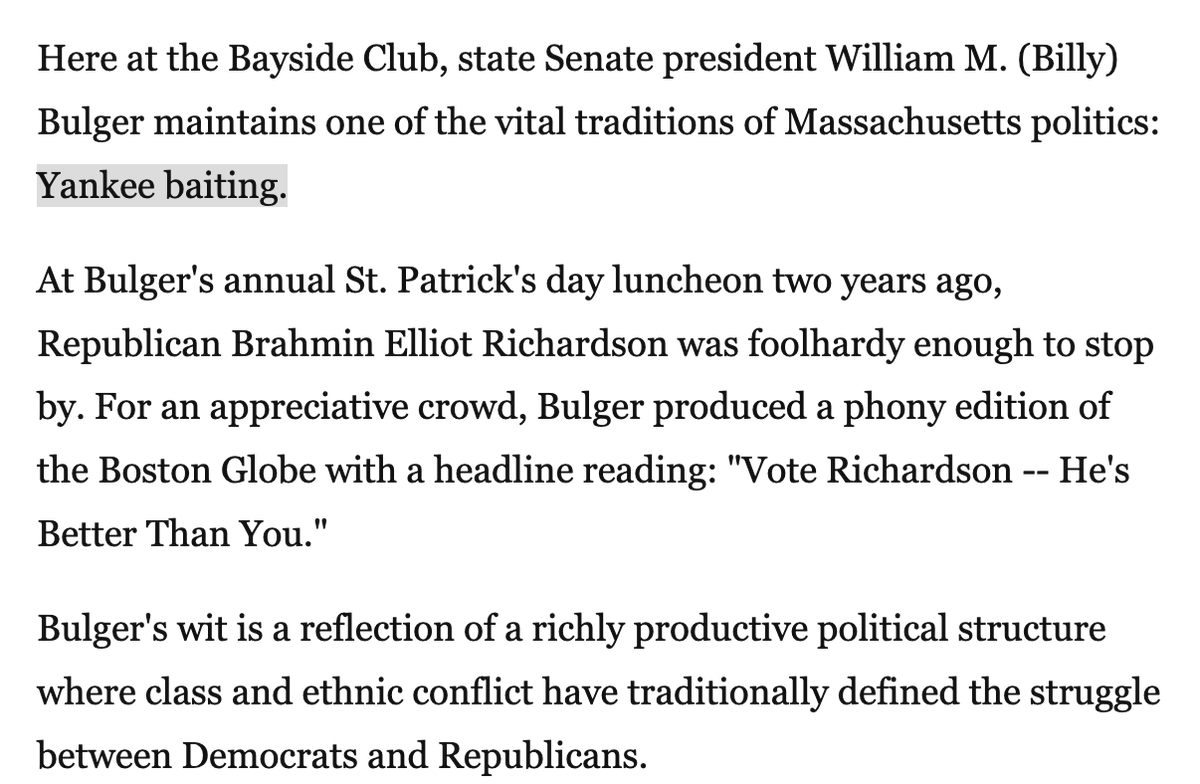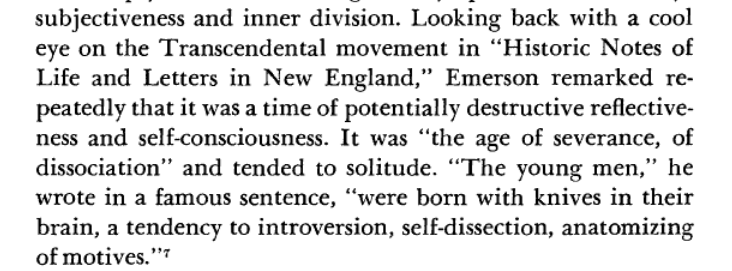
"In one form or another all of the major domestic problems facing you derive from the erosion of the authority of the institutions of American society. This is a mysterious process of which the most that can be said is that once it starts it tends not to stop." 

"… All we know is that the sense of institutions being legitimate—especially the institutions of government—is the glue that holds societies together. When it weakens, things come unstuck"
"… Moreover we retain a tradition of revolutionary rhetoric that gives an advantage to those who challenge authority rather than those who uphold it.… Yet it remains the case that relationships based on authority are consensual ones..."
"… That is to say they are based on common agreement to behave in certain ways. It is said that freedom lives in the interstices of authority: When the structure collapses, freedom disappears, and society is governed by relationships based on power."
"Increasing numbers of Americans seem of late to have sensed this, and to have become actively concerned about the drift of events. Your election was, in a sense, the first major consequence of that mounting concern."
"Your administration represents the first significant opportunity to change the direction in which events move.
Your task, then, is clear: to restore the authority of American institutions."
Your task, then, is clear: to restore the authority of American institutions."
"Not, certainly, under that name, but with a clear sense that what is at issue is the continued acceptance by the great mass of the people of the legitimacy and efficacy of the present arrangements of American society, and of our processes for changing those arrangements."
"...those in power have allowed domestic dislocations that accompany successful social change to be interpreted as irrefutable evidence that the society refuses to change; they have permitted foreign-policy [errors] to be taken as...proof that the society has gone mad as well." 

"Since about 1840, the cultural elite in America have pretty generally rejected the values and activities of the larger society."
?
?

"… At the great risk of using a term of clinical psychiatry to describe a crisis in the culture, I would offer the thought that American society is becoming more and more schizophrenic. Two opposite and increasingly equal tendencies...are splitting the nation."
"To a degree that no one could have anticipated even three or four years ago, the educated elite of the American middle classes have come to detest their society, and their detestation is rapidly diffusing to youth in general."
"
… In the best universities, the best men are increasingly appalled by the authoritarian tendencies of the left. The inadequacies of traditional liberalism are equally unmistakable, while, not least important, the credulity, even the vulgarity of the supposed intellectual..."
… In the best universities, the best men are increasingly appalled by the authoritarian tendencies of the left. The inadequacies of traditional liberalism are equally unmistakable, while, not least important, the credulity, even the vulgarity of the supposed intellectual..."
"...and social elite of the country has led increasing numbers of men and women of no especial political persuasion to realize that something is wrong somewhere.
These persons are the president’s natural allies. They can be of help to him, and to the country..."
These persons are the president’s natural allies. They can be of help to him, and to the country..."
"...But I do not see them brought into our counsels. Mostly, if I am right, because of a sense of inadequacy hereabouts. Better stick with Kate Smith and the Silent Majority. They aren’t very smart, but then neither are we."
"...Moral authority and political power. Pragmatism is a noble political tradition. It is vulnerable, however, to a form of oversight which can be calamitous. The pragmatic mind in politics tends to underestimate, even to be unaware of, the importance of moral authority. …"
"...What is to be done? This first thing to be clear is that our own power to influence events is limited. America has developed...'an adversary culture.'...The “culture” is more in opposition now than perhaps at any time in history."
"The president will have to live with it permanently, I should think. We can’t change this. … But in the meantime, it is within our power to make matters worse. We have shown that we can do so. I would argue that in such circumstances the first [rule] of patriotism ..."
"...is the willingness not to worsen things, even when the provocation is outrageous, even when there may appear to be a short-term advantage to be gained. This is not just the measure of patriotism, it is the measure of prudence as well."
"...When attacked, nobody defends us. No one in the Congress, certainly no 'liberal' Republican helps us. No one writes articles for us..."
What exactly was up with this? I think I can guess at the combination of factors that led to it, but it just seems like such an unnecessary disintegration. 

Yeah. I realize it is all beside the point now, but the Republicans seemed to lose their amazing instincts for national leadership overnight, and they have never recovered them. It's clear to me now that Dems are inherently unable to provide national leadership, so we're done. 



It's hard to see how we could ever have gotten around the parties issue. At least one party would have to go very ideological at some point, in order to coordinate different interests into a coalition. Then it's either 2 ideological parties, or one "oppressing" the other.
Parties can't be mirror images in some free market situation. One of them has to be somehow "privileged," or you live in some form of civil war. We're just way off the rails into fantasyland, and it's sad that the leaders just let it happen so casually.
• • •
Missing some Tweet in this thread? You can try to
force a refresh

























